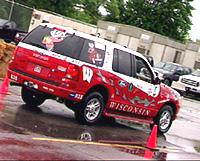Wisconsin Badgers Win FutureTruck Competition
 BadgerMobile |
By: Eric Mitchell | Ford Communications Network
DEARBORN, Mich., June 18, 2004 -- As the World Champion Detroit Pistons celebrated with a downtown Detroit victory parade, engineering students from the University of Wisconsin-Madison were celebrating a first place three-peat at Ford World Headquarters. The team from Wisconsin took top honors in FutureTruck 2004, just as they did in 2002 and 2003."It was a real team effort, a lot of hard work and no sleep, but it was fun," said Dan Bocci, student participant, University of Wisconsin-Madison.
"It's extremely exciting," said Christine Behncke, student participant, University of Wisconsin-Madison. "It was a great experience, a lot of Friday nights, but it was all worth it."
The FutureTruck competition is sponsored by Ford Motor Company and the U.S. Department of Energy. The event attracted teams of engineering students from 15 universities across North America. The challenge was to re-engineer a 2002 Ford Explorer to improve fuel economy and reduce emissions, without compromising the performance, functionality and customer appeal of the vehicle.
Improving on the best-selling SUV in America is a formidable task for experienced engineers, let alone college students. But these are some of the best and brightest young people anywhere, and many of them have spent three years refining and upgrading their vehicles with cutting-edge technologies. Each of the Explorers is now a hybrid, using various battery packs and alternative fuels. They employ complicated electronics and lightweight materials.
The winning team from Wisconsin used a Ford Lynx 1.8-liter compression-ignition engine running on bio-diesel fuel, plus an electric motor. The team scored a 33 percent improvement in fuel economy, tops in the competition. A selective catalytic reduction catalyst and particulate filter helped the Wisconsin vehicle also lead the pack with the greatest reduction in greenhouse gas emissions.
"We had no major breakdowns during the competition," said Bocci. "The truck performed just like we expected."
The team from Penn State University took home second place honors and Georgia Tech placed third.
"All of the teams showed great tenacity and engineering skill," said Pat Ford, Ford project manager, FutureTruck 2004. "They ran through rain and sun, a blackout, and they still persevered."
The complexity of each vehicle demands the sharp focus of each team member, but these are college students, so don't think this competition was all work and no play. The Wisconsin team nicknamed their Explorer the "moolander" and they fly an inflatable cow as a mascot. Each year the cow disappears, and so does its replacement. It's just one example of the camaraderie that develops when young people get together in a friendly competition.
"They're all good people," said Behncke. "We help them, they help us. We share parts. It's very friendly."
The eight days of vehicle performance testing wraps up three years of new ideas and creative thinking by these teams of students. The work, of course, will continue, and one day some of these advanced technologies just might roll down the assembly line at Ford Motor Company.
"This competition helps develop tomorrow's engineers by giving students a unique hands-on opportunity to work with and explore, clean fuel efficient technologies," said Al Kammerer, executive director, SUV and Body on Frame Vehicles, Ford Motor Company. "These are the engineers who will lead the automotive industry in the 21st century. They're the type of people we want working for Ford."
"Our outstanding partnership with Ford has shown what government and industry can do when working together with academia to develop energy efficient technologies for the future," said Spencer Abraham, secretary, U.S. Department of Energy.


